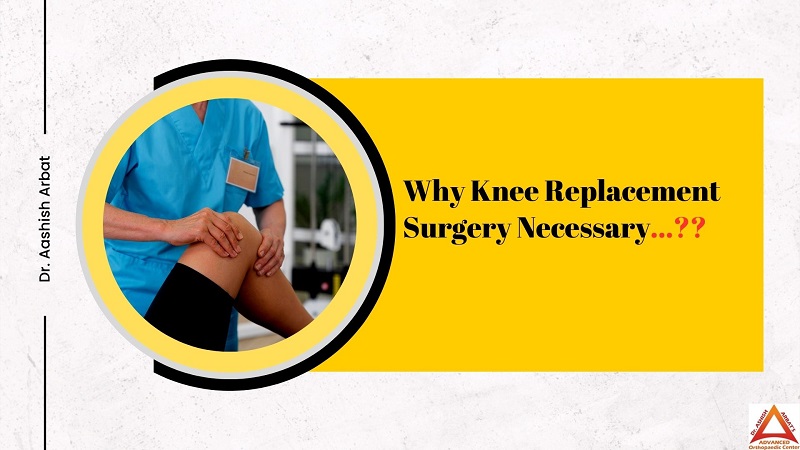
Have a question regarding “why knee replacement surgery necessary?” Knee replacement surgery (or total knee arthroplasty) has revolutionized the lives of millions of people with chronic knee discomfort. Imagine getting rid of terrible pain & enjoying walking, jogging, & an active lifestyle again.
To learn more, explore why knee replacement surgery necessary & a game-changer for pain-free living, illustrated by Dr. Aashish Arbat, an Internationally accredited renowned Orthopedic Doctor in Pune, Thane & Maharashtra.
Contents
The Truth About Knee Replacement Surgery
Extensive research & surgical technique advancements have proven to improve outcomes & patient satisfaction for individuals with severe knee joint conditions.
Why Knee Replacement Surgery Necessary?
- Surgery may be needed if medicines & physical therapy failure. The surgical procedure involves the replacement of the injured knee joint with an artificial joint (prosthesis) that replicates natural knee movement.
- Chronic knee pain, rigidity, & swelling that cannot be relieved by conservative treatment must be treated surgically.
- Knee replacement surgery is commonly required for severe knee conditions such as osteoarthritis, rheumatoid arthritis, & traumatic knee injuries to improve quality of life by lowering pain & allowing normal daily tasks.
- Overall, knee replacement surgery is an established & effective treatment option for regaining independence & living a more active, pain-free life.
Dangers of Delaying Knee Replacement Surgery
- Decreased quality of life: Delaying knee replacement surgery can lead to a decline in quality of life, limited mobility, diminished muscle strength, & an increased risk of falls.
- Further joint damage (severe joint issues): Delaying the procedure may result in additional joint injury, making the surgery more difficult & increasing the chance of complications.
A Research Review on Dangers of Delaying Knee Replacement Surgery
A study analyses the implementation of total knee replacement surgery in patients with knee osteoarthritis.
The research indicates the demand for a better understanding of when to perform total knee replacement to optimize outcomes for patients. Waiting too long may restrict physical activity & raise the chance of disability & chronic illness, whereas doing the surgery too early may either benefit or pose dangers.
Types of Knee Replacement:
- Total knee replacement: This procedure involves total knee joint replacement.
- Partial knee replacement: In cases where only a portion of the knee joint is damaged, partial knee replacement involves the replacement of only the damaged portion.
- Complex or revision knee replacement: This procedure is performed when a previous knee replacement fails, or additional complications occur.
Knee Replacement Surgery Cost
Knee replacement surgery cost varies based on the country, hospital, surgeon, & insurance coverage. Typically, it comprises pre-operative assessments, surgery, hospitalization, post-operative care, & rehabilitation.
It is important to consult with Dr. Arbat, the Knee Replacement Surgeon in Pune, & insurance companies (if you are registered) to determine the exact costs associated with the procedure.
How Painful is a Total Knee Replacement?
- Anesthesia during surgery: Recent developments in pain treatment have made knee replacement surgery far more comfortable for patients. Anesthesia is administered to ensure that the surgical procedure is painless.
- Post-operative pain management: Pain medication is administered after surgery to alleviate pain. The overall objective of knee replacement surgery is to relieve chronic knee pain & enhance the quality of life. During recovery, some pain & discomfort are to be anticipated.
How Long Does a Knee Replacement Last?
- Average lifespan: Knee replacements can last between 15 & 20 years on average. Age, activity level, body mass index, & implant type can influence the implant’s longevity.
- Maximizing lifespan: Following post-operative instructions, undergoing regular checkups, & maintaining a healthy lifestyle can prolong the implant’s life.
Knee Replacement Surgery Time
- Duration of surgery: 1-3 hours is the average duration of knee replacement surgery. The surgical time can be affected by variables such as the complexity of the case, additional knee joint injury, & the surgeon’s skill.
- Hospital stay: The average length of a hospital stay is between three & four nights, while certain conditions may need shorter stays or even outpatient care.
Disadvantages of Knee Replacement Surgery
- Potential complications: Rarely, problems including infection, clotting, stiffness, premature implant failure, & chronic discomfort (long-term pain) might occur.
However, these risks can be avoided through proper care & adherence to the surgeon’s instructions.
Conclusion
People with serious knee joint damage or arthritis often need to undergo knee replacement surgery. Understanding the potential disadvantages, costs, pain level, & longevity of knee replacement surgery is crucial. Recognizing the risks of postponing the treatment & the various knee replacement types is crucial. Consider these considerations & consult with Dr. Arbat, a Knee Replacement Surgeon in Pune, to decide whether & when knee replacement surgery is needed.
Dr. Aashish Arbat – Best Knee Replacement Surgeon in Pune
Dr. Aashish Arbat, a prominent Joint Replacement Doctor in Pune, is renowned for his robotic joint replacement surgery proficiency. Doctor is dedicated to enhancing patient outcomes by emphasizing high-quality healthcare, innovative technologies, & a holistic approach to patient care. His academic accomplishments include degrees from prestigious institutions, & he continually updates his skills for the benefit of the community.
Dr. Arbat uses modern technologies like RoboAlign to perform accurate & individualized knee joint replacements, resulting in faster recovery & healthier patient outcomes.
Reference
- https://www.ncbi.nlm.nih.gov/books/NBK11960/
- https://www.uptodate.com/contents/total-knee-replacement-beyond-the-basics/print
- https://pubmed.ncbi.nlm.nih.gov/30496082/
- https://www.ncbi.nlm.nih.gov/pmc/articles/PMC7508265/

